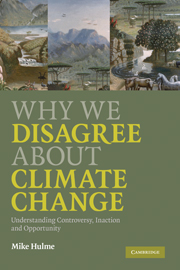Book contents
- Frontmatter
- Contents
- List of Figures
- List of Tables
- List of Boxes
- Acknowledgements
- Foreword
- Preface
- 1 The Social Meanings of Climate
- 2 The Discovery of Climate Change
- 3 The Performance of Science
- 4 The Endowment of Value
- 5 The Things We Believe
- 6 The Things We Fear
- 7 The Communication of Risk
- 8 The Challenges of Development
- 9 The Way We Govern
- 10 Beyond Climate Change
- Bibliography
- Index
- References
3 - The Performance of Science
Published online by Cambridge University Press: 05 April 2013
- Frontmatter
- Contents
- List of Figures
- List of Tables
- List of Boxes
- Acknowledgements
- Foreword
- Preface
- 1 The Social Meanings of Climate
- 2 The Discovery of Climate Change
- 3 The Performance of Science
- 4 The Endowment of Value
- 5 The Things We Believe
- 6 The Things We Fear
- 7 The Communication of Risk
- 8 The Challenges of Development
- 9 The Way We Govern
- 10 Beyond Climate Change
- Bibliography
- Index
- References
Summary
Introduction
In February 2007, American physicist Fred Singer and biologist Dennis Avery published a book in the USA called Unstoppable Global Warming: Every 1,500 years. The authors argued that the warming currently being observed around the world is part of a natural 1,500-year cycle in solar energy and that, consequently, attempts to reduce global warming this century by controlling human-originated emissions of greenhouse gases are largely futile. That same month the Fourth Assessment Report from the Intergovernmental Panel on Climate Change (IPCC) was published. Here it was claimed that ‘most of the observed increase in global average temperatures since the mid twentieth century is very likely [i.e. more than 90 per cent chance] due to the observed increase in anthropogenic greenhouse gas concentrations’.
These claims cannot both be true: the observed warming cannot be largely due to changes in solar energy and at the same time be due mainly to rising greenhouse gas concentrations. Both claims might be wrong, but they cannot both be right. One common expectation of science is that it should be able to adjudicate between such competing claims to truth: seeking out evidence, testing that evidence and distinguishing between fact and error.
The above example concerns the ability of science to evaluate the veracity of the proposed causes of climate change. Another important contribution of science to debates about climate change is its attempt to establish the value of what is known as the climate sensitivity (see p. 47 for definition).
Information
- Type
- Chapter
- Information
- Why We Disagree about Climate ChangeUnderstanding Controversy, Inaction and Opportunity, pp. 72 - 108Publisher: Cambridge University PressPrint publication year: 2009
References
Accessibility standard: Unknown
- 2
- Cited by
